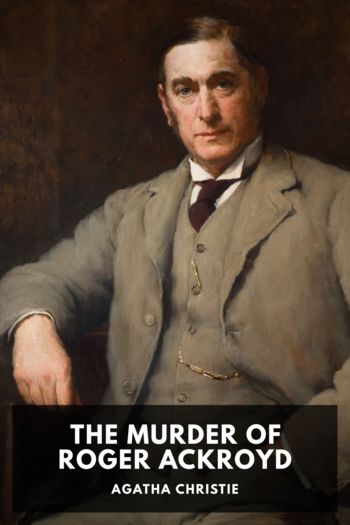The Clerkenwell Tales Peter Ackroyd (nice books to read TXT) 📖

- Author: Peter Ackroyd
Book online «The Clerkenwell Tales Peter Ackroyd (nice books to read TXT) 📖». Author Peter Ackroyd
The physician was successful at his craft because he possessed a sensitive and sympathetic nature; he could tell, from a gesture or an expression, the nature of the illness he was called upon to treat. Now, on the edge of the field, he was consumed by a sadness so intense that it seemed to drive out every other emotion and perception. How must it be to live friendless and alone in this world? With no one sad for your sorrow? He watched the boy for a moment or so longer, but he could not bear his suffering. He no longer wished to ride onwards – there was no more to see. Instead he mounted his horse and returned in the direction of the city. When he came up to the wall he began to sing, “Draw me, draw me near, draw me near the jolly juggler.”
The young man whom Thomas Gunter had seen, and pitied, was Hamo Fulberd. He had chosen the field as the place fittest for him. It was known as Haukyn’s Field; there was a brook running upon its southern side, with a copse of trees upon its north. When he was later asked to describe it, Hamo said that “it was just a plain bare field only.” He had come here before the events of the spring, but now for the first time he had disobeyed Exmewe’s command and left the precincts of St. Bartholomew’s. The field had called him, as if to share his misery. He had taken the pony and had ridden here during the night. He had come because he could no longer bear the sight of his familiar world; it seemed to encircle him or, worse, to enter his soul. What if this world were all that is, and was, and ever would be? What if, from the beginning to the end of the thing men called time, the same people merged continually with one another?
Ever since Exmewe had told him that he had killed the tooth-drawer, he had considered himself lost. He had heard no more about the man, and he assumed that any pursuit of the murderer had passed. But, for some reason, that rendered him all the more fearful of judgement. He looked into the night sky, at those stars of the circle which is called Galaxia or Watling Street, but found no comfort there. He had asked Father Matthew, the head of the scriptorium, if there were forgiveness for all. The friar had replied that “no one knows if he is worthy of the love of God.” This also did not comfort him, any more than Exmewe’s belief that he was a predestined one and therefore blessed. Nothing was right or wrong. We are all in the night.
He saw nothing ahead of him but darkness, as if he were trapped in a vaulted space of cold stone. He had an image of God, laughing, as he doled out dooms and destinies. Or was there some overwhelming grief always waiting to seize upon a poor spirit such as his? Would there always be people as sorrowful as he? Or did that grief seize upon one place? Was that why he was drawn to Haukyn’s Field? Did all the forces of the world, which wise men said was round, work together? So in his adopted place, in this small field, he pondered these questions. He looked down upon the ground, since he did not wish to be distracted from his ever increasing thoughts. His head was bowed, as if those thoughts had already grown too heavy. Sometimes he would mumble to himself; he believed that his words were not worthy enough to be spoken out loud.14
He was bewildered by himself. He did not care particularly whether he failed or prospered, but this was worse than all – he could not grasp what was happening to him. He stayed in Haukyn’s Field until the moon appeared above him, and then he rode back slowly to St. Bartholomew. When he arrived there, William Exmewe was waiting for him. “You disobeyed me,” he said. “You wandered abroad.” He struck him across the face.
Hamo did not flinch. Instead he brushed back his hair, and stood more upright. “I must go somewhere. I am mewed up here like a bird.”
“I am protecting you, Hamo, as a nurse protects her innocents. I will soon have work for you. So be steady.” Exmewe said nothing else, and left the barn.
Chapter Eleven
The Monk’s Tale
“Well, there is no new guise that has not been old.”
“True enough. This wide world turns upon a wheel. Ancient things return.” They were conversing in the library of Bermondsey Abbey, surrounded by many old parchments and chained volumes; the dust of the ages seemed to have settled upon them. The sergeant-at-law, Miles Vavasour, and the monk, Jolland, were sitting at a long table with a copy of Expositio Apocalypseos by Primasius before them; they were discussing a sentence by Primasius in which he lamented the greed and hard-heartedness of certain second-century bishops. A casual observer might have wondered why a lawyer of high degree had taken off his white silk hood in order to speak familiarly with an ordinary monk; but Miles Vavasour already knew the Cluniac by repute. Jolland was a learned man who had laboured for many years upon a commentary to Bede’s Historia Ecclesiastica Brittaniarum et maxime gentis Anglorum, and was considered to be the greatest of all scholars on the early history of England and its Church. But Vavasour had come to test the monk’s faith. He respected him for his learning, and wished to see how far





Comments (0)